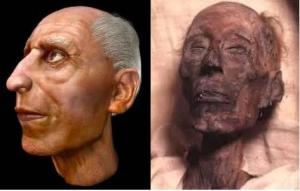The late Steve Hays was a Protestant Reformed, anti-Catholic apologist, very active online, who ran the site, Triablogue. In this series of articles, I will be critiquing many portions of a collection of his entitled “Annotated prooftexts [for Calvinism]” (7-7-14). Hays writes in his introductory section:
I’m going to quote a number of Reformed prooftexts, in canonical order, then quote interpretive comments by various scholars. . . . Taken by themselves, Reformed prooftexts might seem to beg the question by presupposing a Reformed interpretation thereof. . . . I’ve gone beyond bare prooftexting to provide exegetical arguments for the Reformed interpretation. . . .
Although both Calvinists and Arminians have their one-verse prooftexts, Reformed theological method is based less on snappy one-liners than tracing out the flow of argument or narrative arc in larger blocks of Scripture (e.g. Gen 37-50; Exod 4-14; Isa 40-48; Jn 6, 10-12, 17; Rom 9-11; Eph 1-2, 4).
Hays utilizes the English Standard Version (ESV) of the Bible, which was produced by over one hundred evangelical Protestant scholars, and follows the literary tradition of the KJV and especially the RSV. When I cite additional Scripture in my replies, it will be the RSV version.
*****
Exod 4:21; 7:3-5
21 And the Lord said to Moses, “When you go back to Egypt, see that you do before Pharaoh all the miracles that I have put in your power. But I will harden his heart, so that he will not let the people go.
3 But I will harden Pharaoh’s heart, and though I multiply my signs and wonders in the land of Egypt, 4 Pharaoh will not listen to you. Then I will lay my hand on Egypt and bring my hosts, my people the children of Israel, out of the land of Egypt by great acts of judgment. 5 The Egyptians shall know that I am the Lord, when I stretch out my hand against Egypt and bring out the people of Israel from among them.”
Pharaoh’s heart was particularly important because the Egyptians believed it was the all-controlling factor in both history and society. It was further held that the hearts of the gods Ra and Horus were sovereign over everything. Because Pharaoh is the incarnation of those two gods, his heart was thought to be sovereign over creation.
Yahweh hardens Pharaoh’s heart to demonstrate that only the God of the Hebrews is the Sovereign of the universe. J. Currid, Exodus: Chapters 1-18 (EP 2000), 113-14.
All passages taken together show that Pharaoh hardened his own heart; when the Bible says God did it in some passages it is figurative. See:
Reply to a Calvinist: Hardening of Pharaoh’s Heart (vs. Colin Smith) [10-14-06]
God “Hardening Hearts”: How Do We Interpret That? [12-18-08; expanded on 1-4-17]
Does God “Want” Men to Sin? Does He “Ordain” Sin? [2-17-10 and 3-16-17]
By indicating that he would control Pharaoh’s resistance to the exodus, God assured Moses that he was totally in control of Pharaoh in every way, able to make him resist as long as necessary even during a buildup of increasingly painful plagues and then make him give up and let the Israelites go at the moment of God’s choosing (which was already the essential message of 3:19-20).
His purpose in preventing Pharaoh from giving in too easily and too early was, as will be seen in subsequent parts of the narrative, to allow himself fully to demonstrate his sovereignty over Pharaoh, the Egyptians, the land of Egypt itself, and the gods in which Pharaoh and the Egyptians trusted. D. Stuart, Exodus (B&H 2006), 146-47.
Pharaoh acted in and of his own free will. God, knowing that He would do that (just as with the Patriarch Joseph’s brothers, etc.), arranged the outcome to His liking, in His providence; as He habitually does in all situations, without violating human free will. God doesn’t ordain evil; that would make Him a monster, who couldn’t possibly be the loving God of Holy Scripture.
The significance of this pattern lies in the observation that even when Pharaoh is subject of the hardening, or when the subject is unmentioned, these statements describe a resulting condition traceable to a previous hardening action caused by God (cf 7:13, 14, 22; 8:15[19]; 9:7, 35). Therefore these statements cannot refer to Pharaoh independently hardening his heart, as many commentators argue. This is not to say that the reality of Pharaoh’s volitional decisions and accountability should be overlooked or ignored; the concern of this study is about the ultimate cause of the hardening.
Typical Calvinist circular reasoning . . .
It is never stated in Exod 4-14 that Yahweh hardens Pharaoh in judgment because of any prior reason or condition residing in him. Rather, as stated in the exegetical conclusion, the only purpose or reason given for the hardening is that it would glorify Yahweh. Therefore, the divine hardening of Pharaoh was unconditional. (Source) [“AN EXEGETICAL AND THEOLOGICAL CONSIDERATION OF THE HARDENING OF PHARAOH’S HEART IN EXODUS 4-14 AND ROMANS 9”, G. K. Beale, Gordon-Conwell Theological Seminary, Trinity Journal 5 NS (1984) 129-154)
God didn’t harden Pharaoh’s heart in the first place. This is the false premise everywhere in play in the above citations. It’s a figure of speech commonly employed in the Bible; a species of idiom. E. W. Bullinger’s Figures of Speech Used in the Bible (London, 1898;eprinted in 1968 by Baker Book House) explains:
I. Verbs in General
i. Idiomatic usages of Verbs
[ . . . ]
4. Active verbs were used by the Hebrews to express, not the doing of the thing, but the permission of the thing which the agent is said to do. Thus:
Genesis 31:7.-Jacob says to Laban: “God did not give him to do me evil”: i.e., as in A.V. [Note: The Authorized Version, or current Text of our English Bible, 1611.] , God suffered him not, etc.
Exodus 4:21.-“I will harden his heart (i.e., I will permit or suffer his heart to be hardened), that he shall not let the people go.” So in all the passages which speak of the hardening of Pharaoh’s heart. As is clear from the common use of the same Idiom in the following passages.
Exodus 5:22.-“Lord, wherefore hast thou so evil entreated this people?” i.e., suffered them to be so evil entreated.
Psalms 16:10.-“Thou wilt not give thine Holy One (i.e., suffer Him) to see corruption.” So the A.V. [Note: The Authorized Version, or current Text of our English Bible, 1611.]
Jeremiah 4:10.-“Lord God, surely thou hast greatly deceived this people”: i.e., thou hast suffered this People to be greatly deceived, by the false prophets, saying: Ye shall have peace, etc.
Ezekiel 14:9.-“If the prophet be deceived when he hath spoken a thing, I the Lord have deceived that prophet”: i.e., I have permitted him to deceive himself.
Matthew 6:13.-“Lead us not (i.e., suffer us not to be led) into temptation.”
Matthew 11:25.-“I thank thee, O Father … because thou hast hid (i.e., not revealed) these things,” etc.
Matthew 13:11.-“It is given to know unto you,” etc. (i.e., ye are permitted to know … but they are not permitted to know them.
Acts 13:29.-“When they (i.e., the rulers, verse 27) had fulfilled all that was written of him, they took him down from the tree, and laid him in a sepulchre”: i.e., they permitted Joseph of Arimathea and Nicodemus to do so.
Romans 9:18.-“Whom he will he hardeneth”: i.e., he suffereth to be hardened. Not that this in any way weakens the absolute sovereignty of God.
Romans 11:7.-“The rest were hardened”: i.e., were suffered to become blind (as in A.V. [Note: The Authorized Version, or current Text of our English Bible, 1611.] marg. [Note: arg. Margin.] ).
Romans 11:8.-“God hath given them the spirit of slumber”: i.e., hath suffered them to fall asleep.
2 Thessalonians 2:11.-“For this cause God shall send them strong delusion, that they should believe a lie”: i.e., God will leave them and suffer them to be deceived by the great Lie which will come on all the world. (pp. 821, 823-824) [link]
Acts 13:29 is particularly instructive and educational in grasping the workings of this idiom in the Bible. It states (figuratively) that the Jewish rulers took Jesus “down from the tree [the cross], and laid him in a sepulchre”. But we know (from other passages) that this was not literally the case, and that these rulers permitted Joseph of Arimathea and Nicodemus to do so. But according the way the idiom works, the Bible states that the rulers did this action because they allowed it to happen by means of other human beings.
Likewise, the Bible often states that God did something when He merely allowed or permitted it. Because He allowed Pharaoh to harden His own heart, Scripture says (using this form of idiom) that He Himself did it.
***
Photo credit: Facial reconstruction of Pharaoh Ramses [or Rameses or Ramesses] II (r. 1279-1213 BC): believed by many Christians scholars to be the Pharaoh who resisted Moses and hardened his heart against God. [Reddit]
***
Summary: I take on some of Steve Hays’ prooftexts for Calvinism. In this instance, the issue is whether God hardened Pharaoh’s heart, or whether the latter did so himself.














